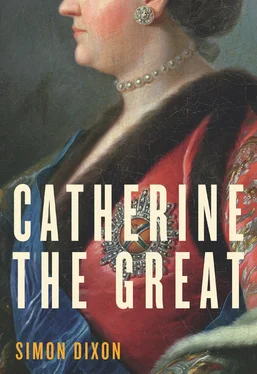Faced with the possibility that his grandmother might become an icon to inspire his critics, Nicholas instinctively tried to prevent them from learning too much about her. He may have allowed Pushkin access to the archives on the Pugachëv rebellion, but he had no intention of permitting the publication of potentially damaging testimony from Catherine’s time. Apart from the empress’s own memoirs, Khrapovitsky’s diary was pre-eminent. ‘No single book,’ judged his friend Ivan Dmitriev, ‘could give a better understanding of Catherine’s mind, character and life.’ 67Like Dmitriev, Alexander Turgenev recognised that Catherine’s secretary, having ‘recorded ipsissima verba everything that he saw and heard’, offered an unparalleled guide to her ‘inner life’ and the morals of her Court. 68Yet such titillating detail was anathema to the tsar. When Pavel Svinin, who had already published fragments of the diary, proposed a complete annotated edition in 1833, the president of the main censorship committee responded on the tsar’s behalf that it was ‘politically speaking premature’ to publish a text which revealed ‘a certain weakening in governmental power, some incongruity in the relationships and behaviour of people close to the Court, and vacillation in the authorities of state’. 69Turgenev was soon to experience a similar frustration when he sought to publish ‘all the gossip’ about Catherine’s Court that he had unearthed in the French diplomatic archives. Nicholas personally retorted that such sources were ‘offensive to Russia and of no historical importance’. 70Catherine’s own memoirs, which implied that all the nineteenth-century Romanovs were descended from Sergey Saltykov, were so incendiary that they remained unpublished in Russia until 1907.
Yet the harder the censors tried to restrict the available information, the more Russians yearned to taste the forbidden fruit. And it was by no means impossible for the well-connected to do so. Catherine’s own memoirs circulated in copies from the manuscript version cherished by Turgenev as ‘the apple of his eye’. The copy that Pushkin lent to the grand duchess Yelena Pavlovna sent her ‘out of her mind’. 71Natalia Zagryazhskaya, the favourite daughter of the Ukrainian hetman Kirill Razumovsky, was a further source of titillating information. Marked down by Catherine herself as ‘an adventuress’ in 1787, Natalia rapidly gained the reputation of one who was exciting but dangerous to know. Pushkin was introduced to her in 1830 on his engagement to her great-niece, and became captivated, like other members of his circle, by this living link with a recent but disappearing past. In the absence of authoritative written sources, it became all the more important to record her anecdotes for posterity. They supplied most of the information for Pushkin’s ‘Table-Talk’, compiled in 1835–6. 72
To the untutored eye, paeans of praise to the late empress might seem no more than saccharine effusions. However, the Catherine myth is better regarded as a series of pointed attempts to reshape the pattern of autocracy. The code was transparent enough. To her idolaters, Catherine’s name stood for liberty of expression, moderation in government, and respectful treatment of loyal subordinates. To her immediate successors, however, she came to personify unnatural female rule, unethical territorial expansion, and an unnerving flirtation with juridical reform and intellectual speculation. As a result, once the first flush of enthusiasm for a revival of Catherine’s ideals had evaporated early in the reign of Alexander I, her devotees made little progress in the first half of the nineteenth century in their attempt to convert their private fascination for the empress into the public adoration they thought she deserved. It was only in the 1860s, once Herzen had published in London the memoirs that Nicholas I had suppressed, that some of the tsarist regime’s most intelligent supporters appreciated that by disowning Catherine and all that she stood for, they had inadvertently handed their radical opponents a powerful weapon. The last four decades of the nineteenth century therefore witnessed a concerted attempt to claw back the empress for the establishment.
* * *
As the secretary of the Russian Historical Society later confirmed, the ‘fundamental idea’ underlying its establishment in 1866 was the assumption that the past would seem the ‘more attractive’ the better it became known. Not for nothing did Alexander II’s foreign minister Prince Gorchakov christen the society and its publications a ‘patriotic enterprise’. 73Catherine was at the heart of the venture. When its patron, the future tsar Alexander III, conferred imperial status on the society in 1873, he expressed pleasure that its work had been directed mainly to the preservation of documents concerning her ‘praiseworthy actions, tending to the well-being of Russia’. 74Together with monthly historical journals such as Russian Archive , whose founder-editor worked from an office dominated by a portrait of the empress, the society published a voluminous series of sources that ultimately permitted a new generation of scholars to give the empress a new lease of life. 75
Historical fiction reached an even wider readership. A year after he retired as a senior official at the Ministry of Education, G. P. Danilevsky wrote his first novella, Catherine the Great on the Dnieper . Twenty years later, it was followed by another, Potëmkin on the Danube . By that time, the author was deputy editor-in-chief of the government newspaper, whose staff was dragooned into publishing a trilogy of more substantial novels about Catherine’s reign. Mirovich and Princess Tarakanova were both based on authentic sources. So was the last and longest of the novels, which continued the theme of rebellion by discussing Pugachëv. 76In 1890, the last year of Danilevsky’s life, he set St Petersburg society alight by delivering a lecture claiming, plausibly enough, that Catherine had married Potëmkin. 77Works such as these helped to lift Catherine’s public profile higher by the centenary of her death than at any time since the reign of Alexander I. According to an American tourist, her picture greeted the visitor ‘everywhere, in every variety of costume and position’. Indeed, the honours were divided with Peter the Great, for both were ubiquitous ‘in effigy or picture or memorial or legend or belongings’. ‘They made Russia what it is’, he went on, ‘but their remembrance is not so fragrant as Washington or Lincoln’. 78
On 24 November 1873, Alexander II inaugurated M. O. Mikeshin’s majestic monument to Catherine in the square outside the St Petersburg Public Library. The tsar had followed every step of its development as the budget almost doubled from the original estimate in 1865 to a total cost of 456,896 roubles. 79At a meeting in his presence on the following day, Academician Grot, who edited Catherine’s correspondence with Grimm for the Imperial Russian Historical Society, claimed that it was now possible to see the empress in a new perspective:
A whole century separates us from that glorious era; passions have cooled; the time has come for the unbiased judgement of history, that unhypocritical judgement which, by means of factual enrichment, is reconstructing the attractive, majestic image of Catherine II more clearly and more brightly as each day passes. 80
In similar fashion, the great Russian historian Vasily Klyuchevsky argued at the centenary of her death in 1896 that ‘posterity’s accounts’ had by then been settled. The empress, he said, had become ‘merely a subject for study’ who could be safely consigned to the ‘remoteness of history’ now that she no longer served as either scapegoat or inspiration. 81
Читать дальше












